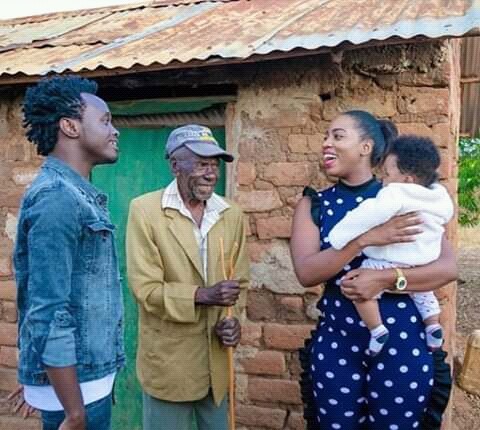Latest 2019 Enumerators’ Census jobs shortlisting, interview dates, guide to interview questions and their answers
The Kenya National Bureau of Statistics, KNBS, is currently recruiting personnel to carry out the 2019 National Census exercise. After applications are received, KNBS will shortlist candidates who meet the minimum set requirements. The shortlisted candidates will then be taken through interviews and successful interviews will be given the jobs on short term basis.
Read also; List of KNBS jobs successful/ recruited applicants
Here is the full Recruitment Schedule as released by KNBS:
Recruitment of Census Personnel
1). Advertisement of all the positions in the print media, website, County, sub county, location and sublocation offices and Receiving applications at the KNBS County offices; 11th – 24th June 2019
8). Identification of the centres for conducting interviews; 17th – 29th June, 2019
2). Communicate to the CCCs through CSOs the number of personnel in different positions (ICT supervisors Content supervisors and Enumerators); 20th June 2019
3). Forwarding of applications/summary forms to the relevant authority; 25th -27 June, 2019
4). Shortlisting and contacting shortlisted ICT Supervisors, Content Supervisors and Enumerators for the interviews; 28th June-7th July, 2019
5). Interview and contacting successful ICT Supervisors, Content Supervisors and Enumerators; 5th – 18th July, 2019
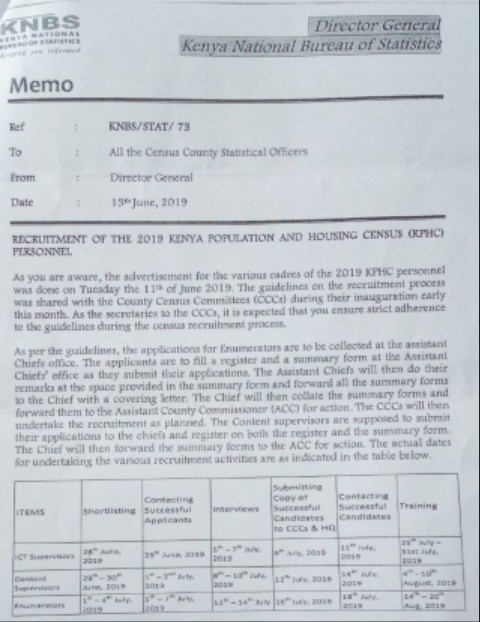
Related Latest News:KNBS- briefing on the 2019 census, recruitment-training and data collection
And below are some of the interview questions that may be asked to shortlisted applicants:
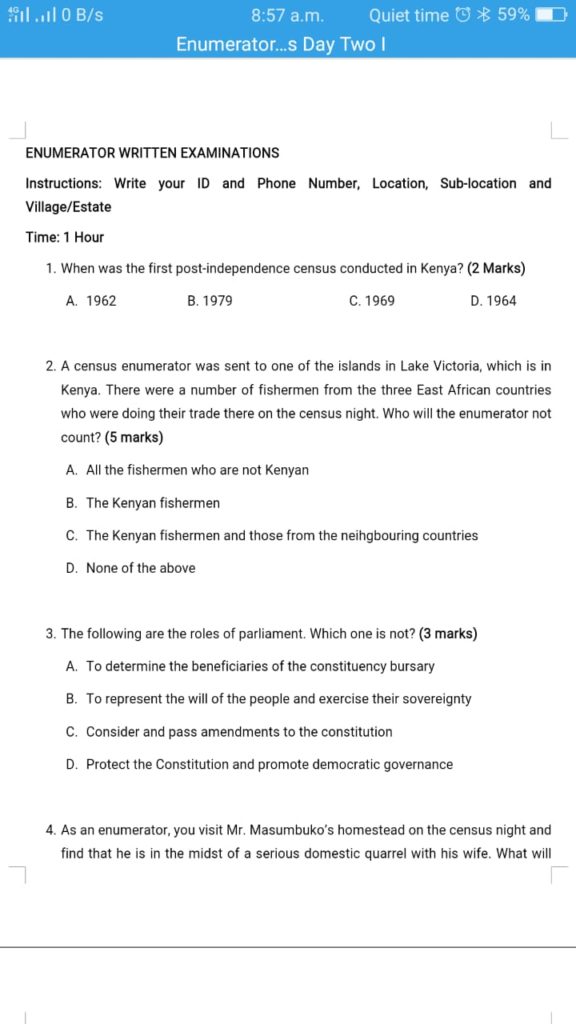
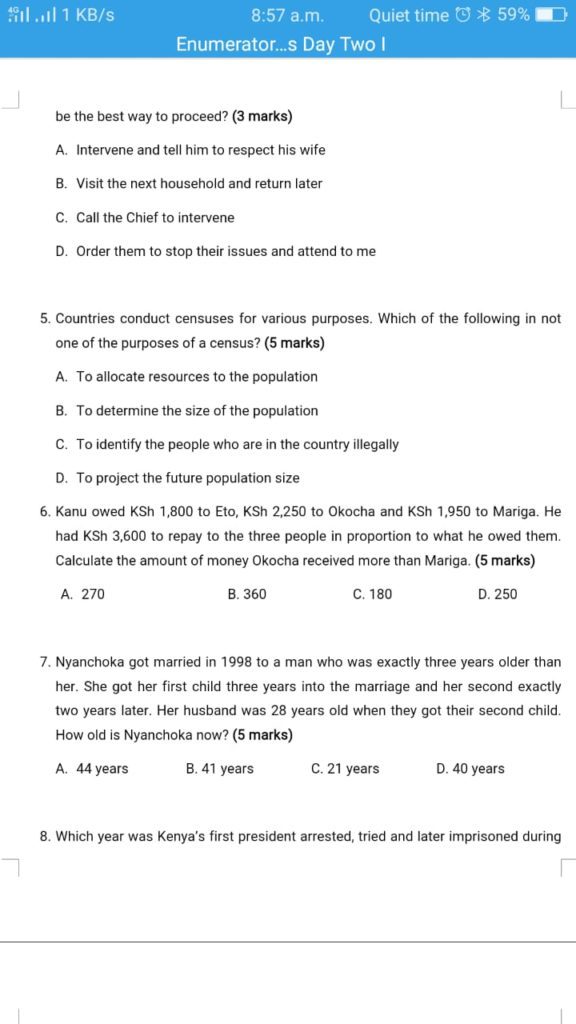
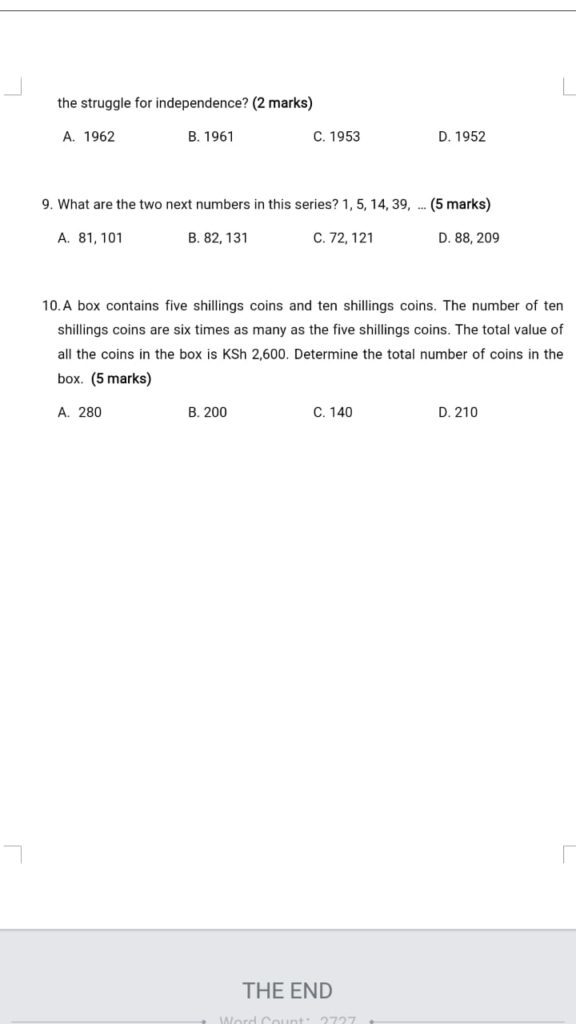
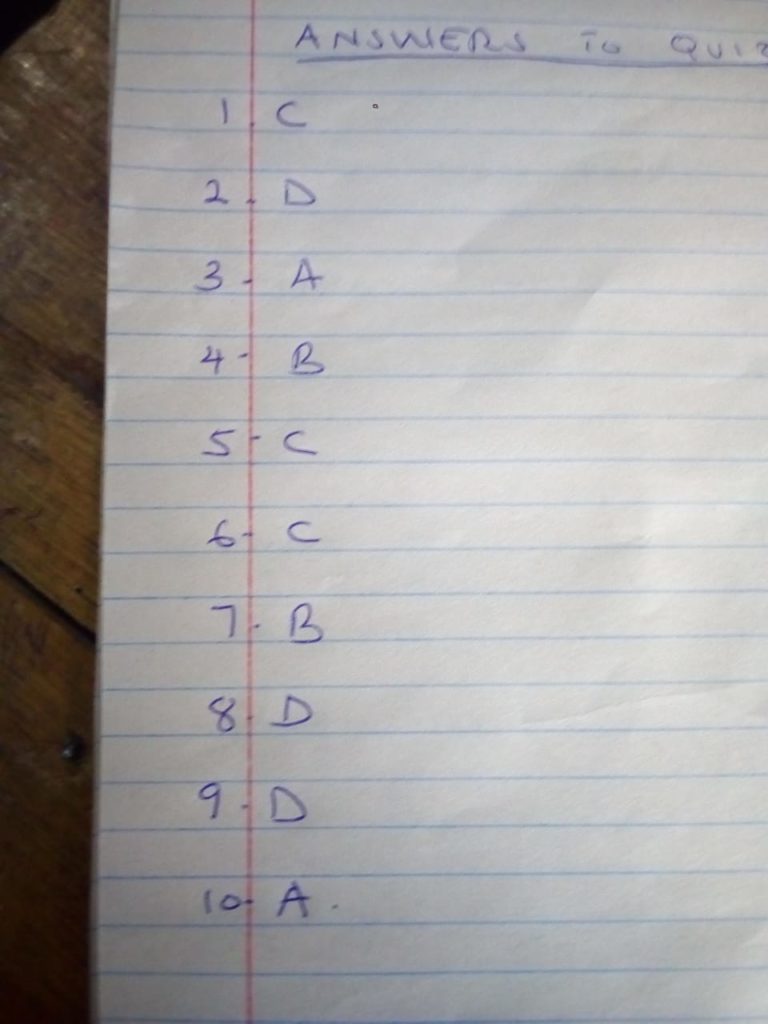
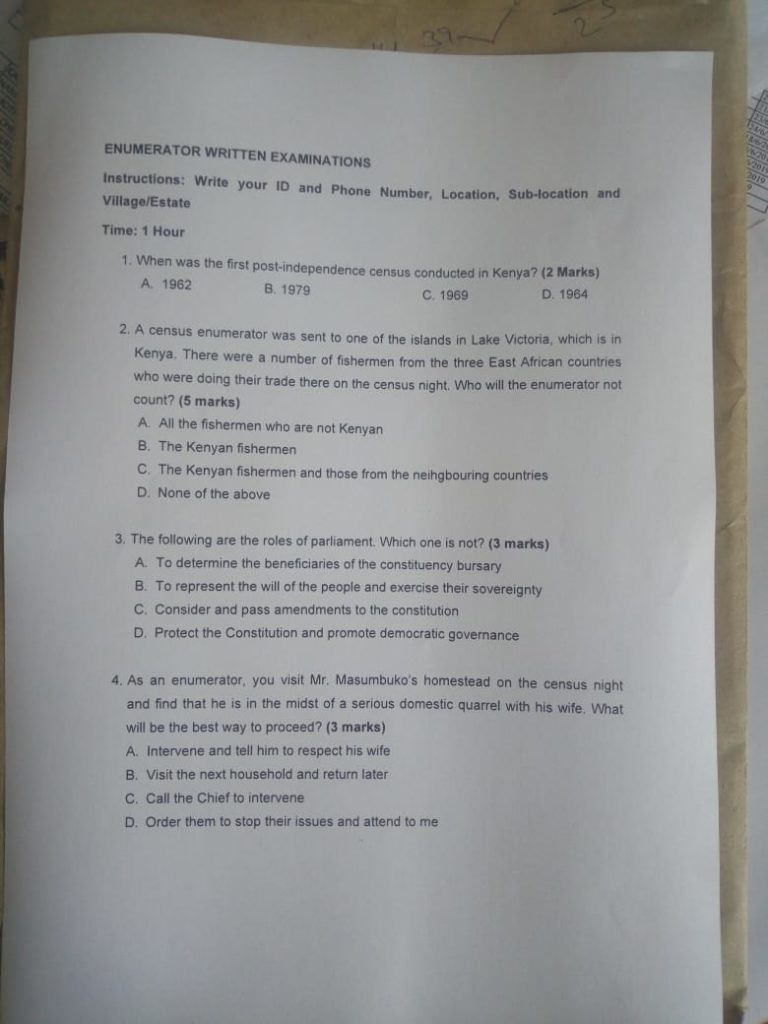


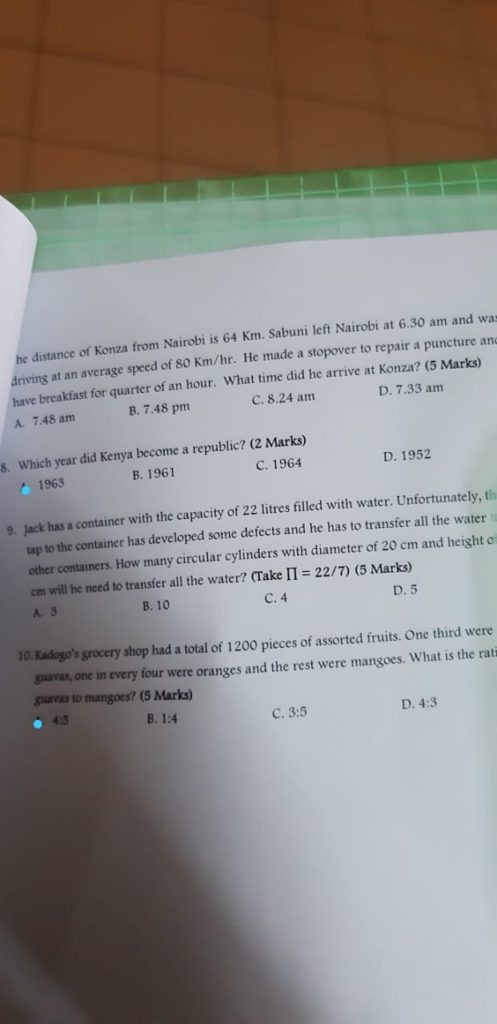
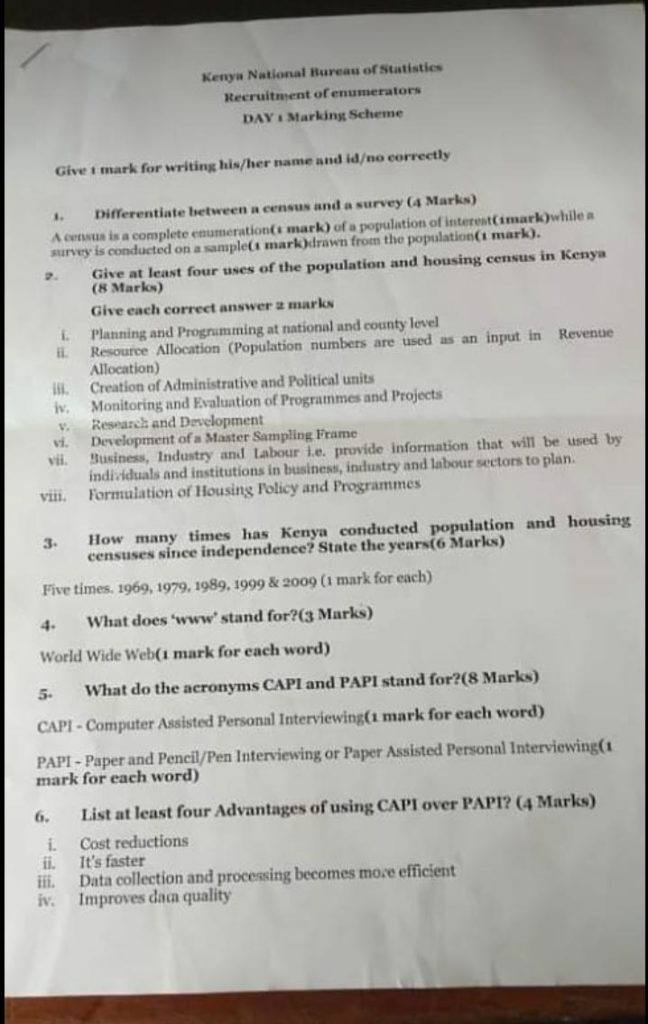
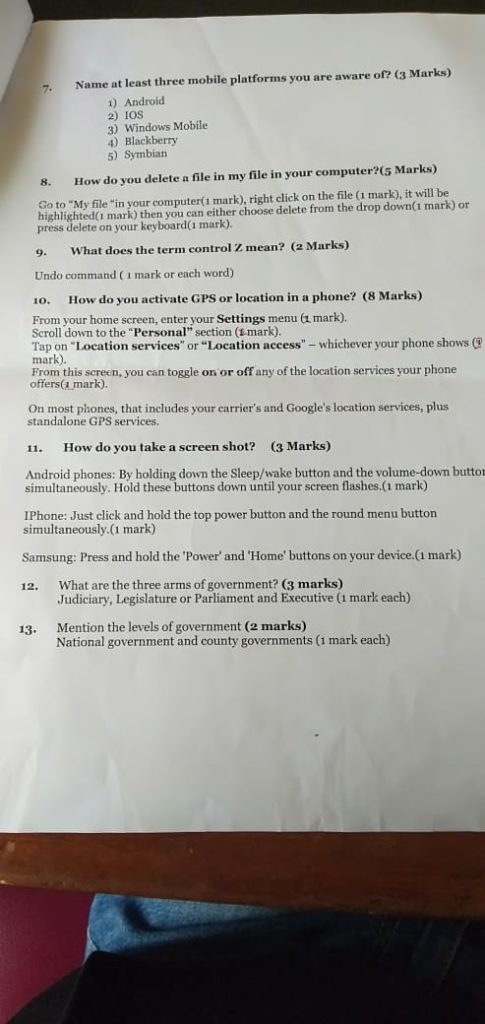
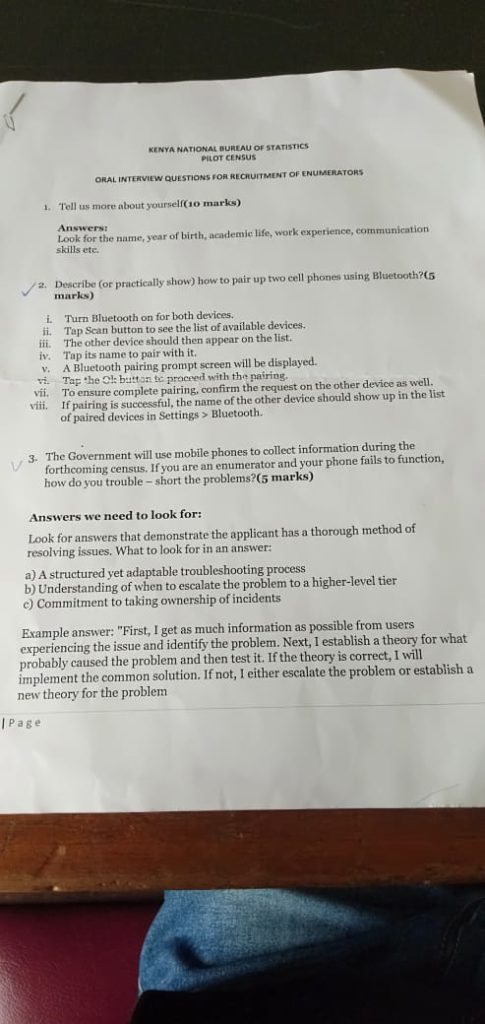
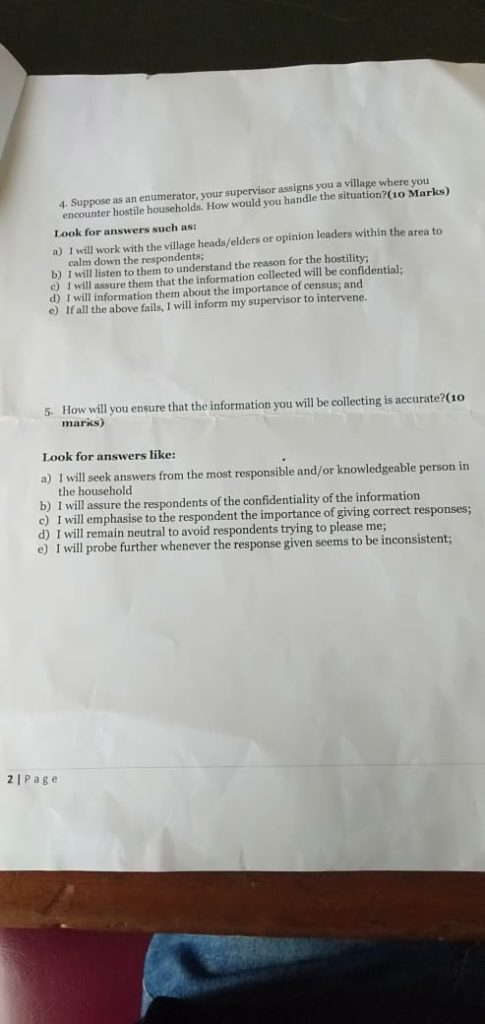
📝Give a brief description of yourself.
An executive summary of your Curriculum Vitae, CV, can do better.
📝What makes you think you are fit for this job?
Give key competencies that are tied to the specific job requirements .
📝What are the key benefits of using Technology in the 2019 National Census exercise ?
Key benefits of using modern technology in data collection during the Kenya Census 2019 will include reduction of time for data processing, analysis and release of the results.
📝For how long will the 2019 Census enumeration be carried out?
The census enumeration will be conducted for up to seven days with the
night of August 24th/25th being the reference night.
📝How important is the Census exercise to the country?
Information that will be generated from the Kenya Census 2019 will help with planning, budgeting and programming for important services; future policy formulation as well as resource allocation across counties and national government.
📝How many Census exercises have been carried in Kenya, so far?
The 2019 Kenya Population and Housing Census will be the 8th in Kenya’s history! Other censuses were conducted in 1948, 1962, 1969, 1979, 1989, 1999 and 2009.
📝When was the Kenya National Bureau of Statistics established?
KNBS was established by an Act of Parliament – the Statistics Act, 2006 No.4. KNBS is a Semi-Autonomous Government Agency under the Ministry of Planning, National Development & Vision 2030.
📝What is the mandate of KNBS?
KNBS is mandated to collect, compile analyze, publish and disseminate official statistics for public use. In addition, KNBS coordinates, monitors and supervises the National Statistical System (NSS).
📝What is the National Statistical System?
The NSS is composed of the individual units engaged in the production and use of official statistics in the country. It comprises producers, users, suppliers of statistical information as well as research and training institutions.
📝How is KNBS organized?
The management of the Bureau is vested in the Board of Directors. The Board consists of a Chair (appointed by the President) and seven other Board members. The Director General is the Chief Executive Officer of the Bureau and Secretary to the Board.
The organization structure of the Bureau is composed of six directorates, each headed by a Director.
📝What are the responsibilities of the Directorates?
Strategy and Development Directorate: responsible for policy research, planning, development of statistical methods and standards, and coordination of the NSS.
✏Population and Social Statistics Directorate: responsible for collection, compilation, analysis and dissemination of demographic and other social sector statistics, as well as maintenance of the Cartography and NASSEP (National Sampling Survey and Evaluation Programme) laboratory.
✏Macroeconomic Statistics Directorate: responsible for collection, analysis, generation and dissemination of macroeconomic statistics of National Accounts statistics, External Sector statistics, Monetary and Financial statistics, Public Finance statistics, Tourism, Transport and Communication statistics.
✏Production Statistics Directorate: responsible for collection, compilation, analysis and dissemination of labour and industrial statistics. This includes employment and earnings, consumer price indices and inflation rates, manufacturing, building and construction, energy and leading economic indicators, business expectation enquiry, agriculture and livestock production, food monitoring and environment statistics.
✏Information and Communication Technology Directorate: Responsible for Bureau Information Systems, Data Processing for surveys and Censuses, Managing the National Socio-Economic Database, Data Dissemination, Printing and/or Publishing, and Library service.
✏Finance and Administration Directorate: responsible for Finance, Administration and Human Resources Management and Development.
📝What are the funding sources for KNBS?
Among the funding sources for KNBS are:
The Exchequer, Development partners such as The World Bank, DfID, AfDB, UNFPA, GTZ, UNDP, JICA, USAID, DANIDA, SIDA, UNICEF and Commonwealth Secretariat
📝What surveys does KNBS undertake?
KNBS undertakes two broad types of surveys, namely, household-based surveys and establishment based surveys.
These include – but are not limited to – the following:
Kenya Population and Housing Census, Kenya Integrated Household Budget Survey, Kenya Demographic and Health Survey, Malaria Indicator Survey, Adult Literacy Survey, Disability Survey, Kenya AIDS Indicator Survey, Multiple Indicator Cluster Survey, Consumer Price Index, Producer Price Index, Labour Force Survey, Micro and Small Enterprise Survey, Child labour Survey, Agriculture and Livestock Survey, Time Use Survey, Foreign Investment Survey, Integrated Survey of Enterprises, Informal Cross Border Trade Survey, Survey of villas, cottages and campsites, Financial Access Survey, Inbound Outbound Survey, Survey on Expansion of Coverage of Financial Institutions, Annual Survey on Industrial Production, Building and Construction Survey, Survey of Quarrying and Mining
Census of Industrial Production
Other Questions
- What is a population census?
A population census is the total count of a population at a specified time within a country’s boundary or in a well delineated part of a country. - How often is a Population and Housing Census undertaken in Kenya?
Population and Housing Census is conducted every ten years in line with the international standards. Kenya has conducted seven censuses in 1948, 1962, 1969, 1979, 1989, 1999, 2009. Kenya has conducted censuses after every ten years since 1969. - When will the next census be conducted?
Kenya’s next census will be conducted in August 2019 from the night of 24th/25th to 31st August, 2019. - Who will be counted?
All persons who will be found within Kenya’s boundaries on the night of 24th/25th August, 2019 will be counted regardless of whether they are visitors or not. - Who takes lead in implementation of Census in Kenya?
Kenya National Bureau of Statistics, as part of its mandate, spearheads the undertaking of the Census on behalf of the government through, an Act of parliament and a gazetted legal notice. This is done in collaboration with different Ministries, Departments, Agencies, learning institutions private sector and development partners. - Who is Kenya National Bureau of Statistics?
Kenya National Bureau of Statistics (KNBS) is the principal Government agency responsible for collection, compilation, analysis, publication and dissemination of official statistical information and is the custodian of official statistical information. - Why conduct a census?
Census is the primary source of reliable and detailed data on the size, distribution and composition of the population in the country at a specified time. The information collected during census when analyzed gives an accurate picture of how many people are living in the country/county at every administrative level and their living conditions as well as access to basic services. This will inform planners on the social services people require such as education, healthcare, housing and transport. The data is also vital for monitoring internationally and locally agreed upon agenda such as Sustainable Development Goals (SDGs), Vision 2030, the Big Four Agenda etc. - What is new about 2019 Census?
The 2019 Census will be administered using computer aided personal interviewing (CAPI) technique. A tablet will be used to capture the information directly for better accuracy and faster processing of the data. The Bureau has adhered to international guidelines which advocate for the values of professionalism, transparency, accountability and integrity required of statistical systems in maintaining credibility and public confidence. - Who will answer questions in the census questionnaire?
The questions in the questionnaire will be answered by the household head or any other responsible member of the household who can provide the required information about all those who spent the night of 24th/25th August in the household at the time of the interview. - Why do I have to participate in Census 2019?
Census data is used for planning purposes. If you do not participate, the data collected will not be a true reflection of the Kenyan population. The Government as well as private sector needs accurate information for effective planning and policy formulation. - How do I know that the person at my door is from KNBS?
KNBS enumerators will be identified as follows:
a) A branded reflector jacket with the Census and KNBS logos
b) Identification documents provided by KNBS
c) The enumerators will be accompanied by village elders or persons known by the residents who will introduce them to the household - How will you make sure I am counted?
The Kenya National Bureau of Statistics has been conducting cartographic mapping since 2016 where the whole country and existing homesteads and households in the villages are mapped. This will be used to create Enumeration Areas (EAs), each with its map for all villages in the entire country. Each enumerator will be assigned an EA with clear boundaries to guide him/her to ensure total coverage, with no omission or duplication. After your household has been visited a number will be written at a secure place in your household such as the top corner of the door to indicate that counting has taken place in the household. - Whom do I contact in case my household is not covered?
In case your household will not have been contacted by 31 August, a toll free number will be provided for you to contact KNBS to send an enumerator to enumerate your household. - How will the information collected be treated?
The information that you will provide to the census personnel will be treated with strict confidentiality in accordance with the Statistics Act, 2006. According to the Act, anybody working with KNBS who discloses personal details of a respondent is liable to prosecution. Everyone who will be expected to have access to respondents’ personal details during the census, will take an oath of secrecy to ensure that they protect the privacy/confidentiality of those who provided the information. - In which languages are the questionnaires available?
The questionnaires will be in English and Kiswahili languages. The enumerators will also be able to speak in the local dialects since they will be recruited from the localities they reside in. - How long does it take to fill in the questionnaire?
The time taken in a household will depend on the number of persons who will be present in the household on the census night. However, on average, it will take between 35-45 minutes to complete enumeration of a household. - What will show that a household has been enumerated?
After enumeration, the officials will write a number on the door or any visible place on the structure to indicate that counting has been conducted in the household. PLEASE DO NOT ERASE THE NUMBER. - Do I need to show any documents to the enumerator?
The enumerator will take down all particulars as given by you. In case you are not sure of some information (e.g. age) you may check your documents to confirm and provide accurate information. - Will I be enumerated if I am in a hotel or on transit on Census night?
Yes, you will be enumerated irrespective of where you will be on the census night provided you are within the borders of Kenya. There are five different questionnaires that will be used during enumeration. One main questionnaire and four short ones. The main questionnaire will be used to enumerate persons in conventional households; the short questionnaires will be used to enumerate people who are on transit (e.g. at airports, bus stops, etc.), those in institutions (e.g. schools, prisons, hotels etc.), outdoor sleepers and emigrants. - If on the night of the 24th/25th August, I am out of the country, will I be counted?
No. KNBS conducts a de facto census, which means that people will be counted depending on where they will be on the night of 24th/25th August. Anyone who was in the country before midnight of 24th/25th August will be counted; anyone who enters the country after the 24/25th August 2019 will not.
However, a short questionnaire on emigrants will be used to collect information in households that have had emigrants in the last 15 years. Their information will be provided by the head of the household and responsible member of the household. - If I have visitors on the night of the 24th/25th August, should they be counted as part of my household?
Anyone who will be present in your household on the night of 24th/25th August, 2019 will be counted together with your household. Everyone will be counted depending on where they will be on the night of 24th/25th August, 2019. Those who will be on duty working (e.g. a nurse) on that night will be counted with his/her household that he/she will return to the following day after work. - Will refugees be counted?
Everybody who will be within the Kenyan boundaries on census night (night of 24th/25th August 2019) will be counted including refugees. - What questions will be asked?
The census questionnaire that contains questions to be asked during the 2019 Census can be downloaded from www.knbs.or.ke. - Why is the ethnic background asked about?
Data on ethnicity is collected for its statistical value, not because of the numbers but in the label/attribute. The information has enormous socio-cultural value that is useful in planning and research. Ethnicity influences lifestyle, which determines certain demographic, social and economic characteristics that drive socio-economic development. All previous censuses conducted in Kenya have collected data on ethnicity, reflecting a long-standing and continuing demand for information about ethno-cultural characteristics of the Kenyan population. Kenyans are encouraged to use the information positively and responsibly. - Why do you ask questions about the household assets I have in my house?
The information collected gives the status of well-being for the household, and is used to generate economic and social indicators. - Will the general public access the results?
The general public will be able to access the census results once they have been launched. The census results will also be available to the public through the KNBS website and publications (inform of preliminary results, basic reports, detailed reports (monographs), maps etc.). - Has KNBS advertised the census jobs for supervisors and enumerators?
The job advertisements will only be done in the local national newspapers and the KNBS website (www.knbs.or.ke). The positions will be advertised from June 2019. For now no advertisement has been done and the public is advised not to fall prey to conmen who are out to swindle them of money. The Government does not ask for money from its citizens when they apply jobs. - What are the security arrangements in place?
The county census committees will be in charge of security arrangements in the respective counties. This will involve in part use of local administration and recruitment of enumeration personnel from the areas they reside. Each security team is expected to take measures according to the unique security concerns in their areas. - What main roles will be performed by Content Supervisors and Enumerators?
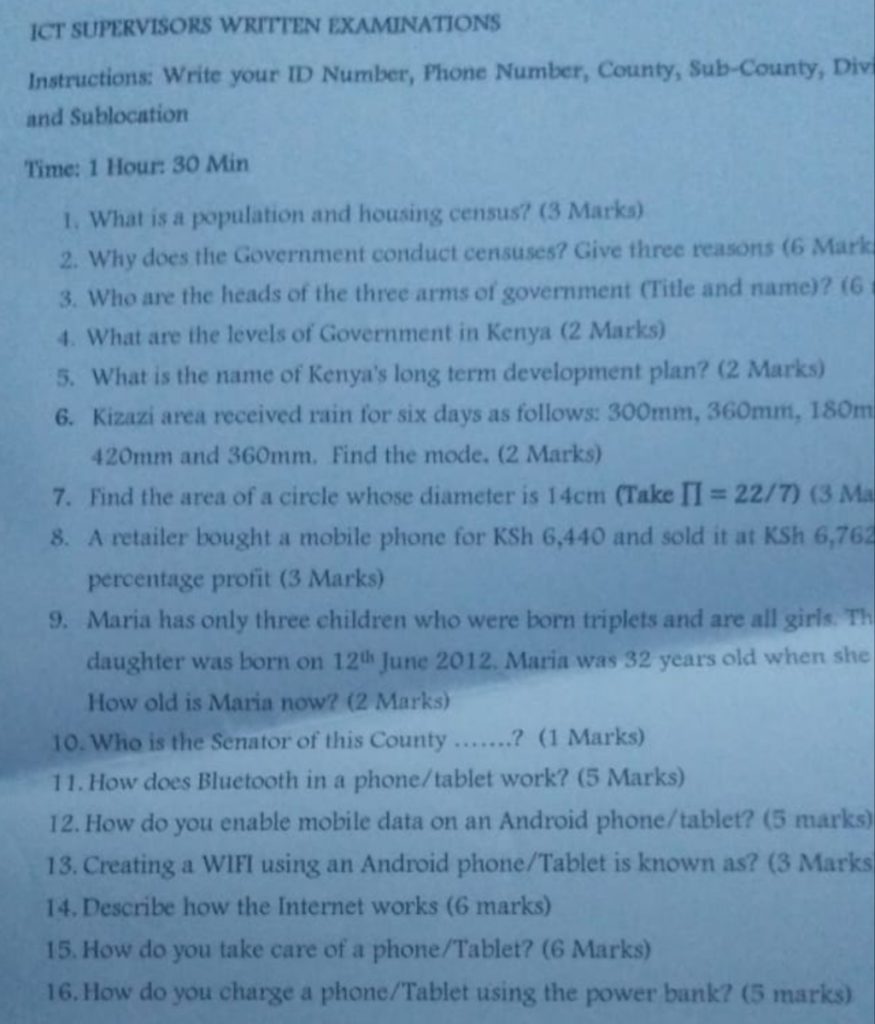


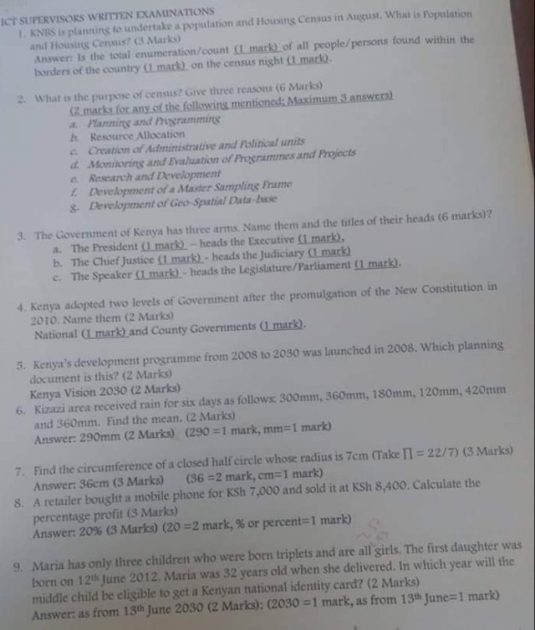
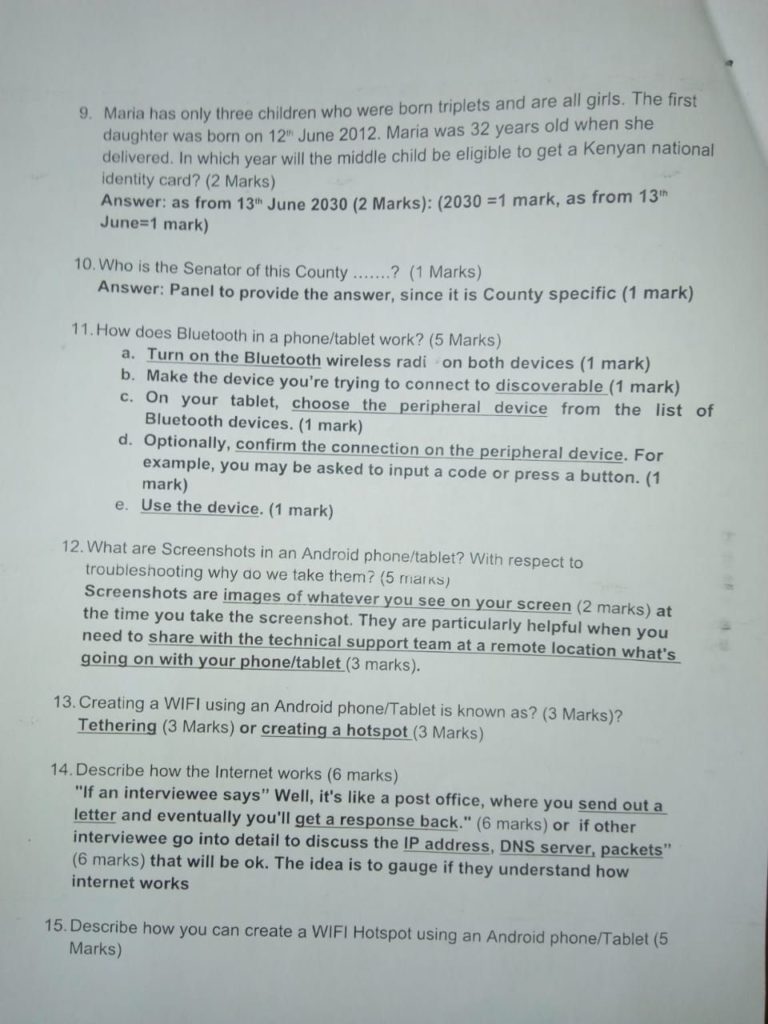
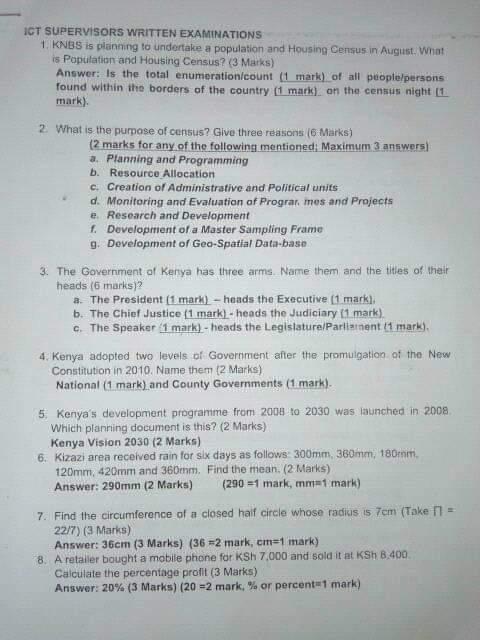
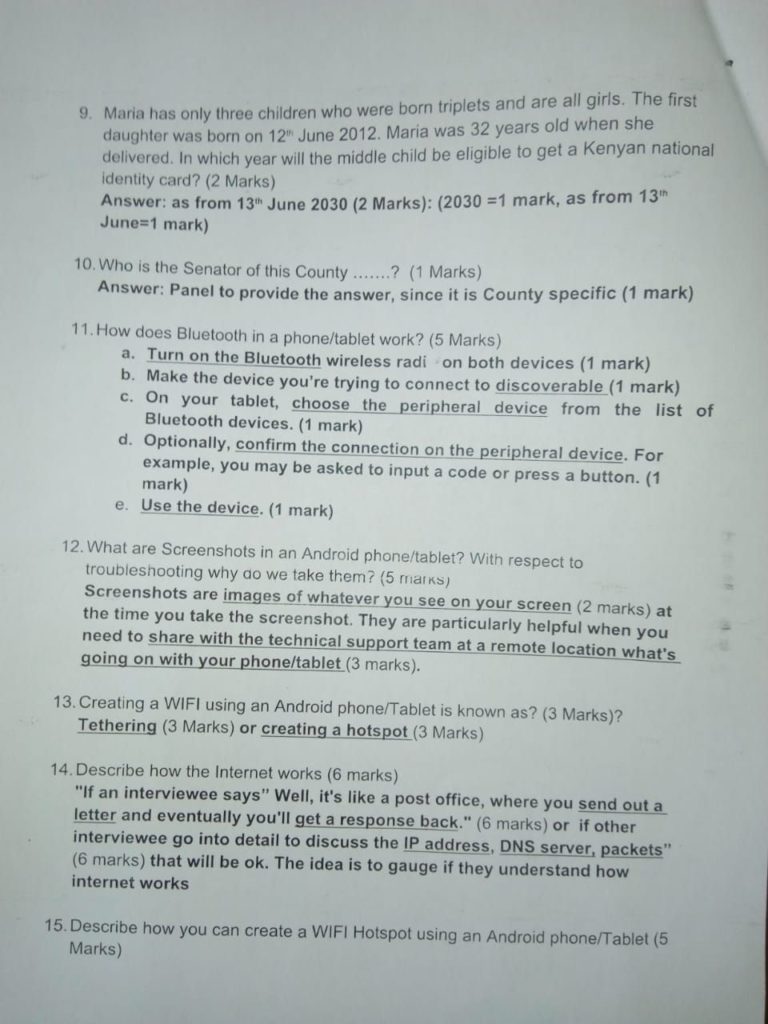

Good luck.
Also read;



